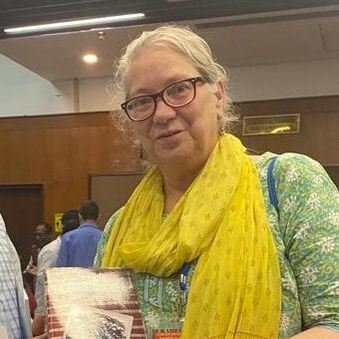|
Proposal:
Like many Americans my family wanted to know the story of our ancestors. We knew very little of my great-great-grandfather, Ferdinand Hahn, who went to India in the 19th century to work among the tribal people (adivasis) of Chotanagpur. When I went to research his time in India, in what is now Jharkhand, I was surprised to learn that he was remembered and honored among many adivasis for advocating on behalf of the Oraon tribe, empowering them, and preserving their oral culture by writing down their folk tales as well as a grammar book of their language. As people learned that I was his great-great-granddaughter, doors opened to me to meet a variety of members of the adivasi community. I was encouraged to write his biography, feeling his story was intertwined with theirs. I learned of my family story through very few oral stories, the majority was through archived written materials. Learning of their legacy sparked my interest in recalling and retelling forgotten heritage stories, especially those passed on orally. My project will: 1) collect oral stories and idioms, gather data about practices, beliefs and perspectives and how they are expressed; 2) revisit with adivasis themselves the folk tales written down mostly by outsiders and 3) review and explore their emerging written literature that is rooted in their oral traditions. Using questionnaires, interviews, focus groups, participation in cultural activities and literary analysis. I will then compile these findings into a dictionary of Adivasi Literature, a glossary of idioms and terms, and a collection of adapted adivasi stories. Despite the fact that many heritage stories have easily been forgotten, the adivasi have a strong cultural identity that is sustained through oral stories. This is despite the fact that about 50% of them no longer live in their traditional villages. By focusing on the text, context and texture of folklore, my methodology will analyze adivasi stories and storytelling, not as a relic of the past but as an ongoing and fluid expression of tribes that are experiencing continuous change. It is essential for indigenous people to guide my study. As an outsider I need to listen to their stories and the significance of these stories in shaping their culture and identity. I have already been aided in this endeavor through my growing list of contacts that includes adivasi activists, church leaders and parishioners, college students and professors. Many of them will invite me to participate in a variety of adivasi events and celebrations in which their cultural stories are often expressed through dance and song in formal and informal settings. I will be working with Sangeeta Das Gupta, Department of Hisoty at JNU-Delhi. I will interview adivasi scholars who apply indigenous wisdom and knowledge to history, environmental studies, law, gender studies, etc, at adivasi universities and colleges around Ranchi. These urban educated adivasis strive to stay connected to the heart of tribal life that remains in the village. I will make an effort to gain the adivasi perspective of nature and society, by visiting villages. This kind of immersive experience is indicative of how retelling historical narratives shape modern narratives. Sharing and collecting stories does more than reinforce individual or group identity. Both the United States and India, the two largest democracies, have rich diversities of culture. Clashing narratives have at times resulted in social unrest and conflict. Projects like this encourage citizens to become familiar with different frameworks of knowledge, such as indigenous wisdom. It is valuable to learn stories of other communities, fostering cross-cultural understanding and promoting a more collective effective vision for our world.
1 Comment
Lupita Navarro
11/20/2023 09:18:52 pm
Wonderful Dear Mary! Many blessings as you are there right now doing the research!
Reply
Leave a Reply. |
Details
ArchivesCategories |

 RSS Feed
RSS Feed
